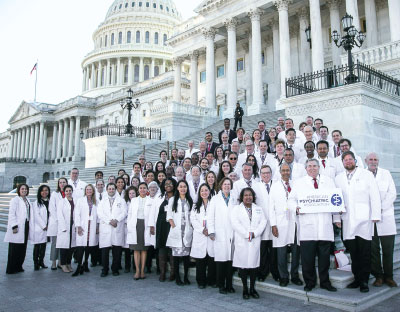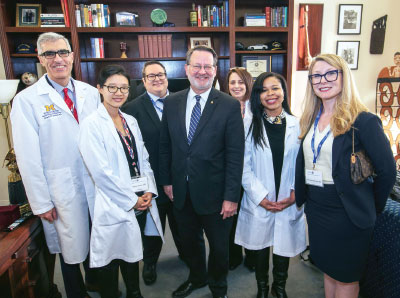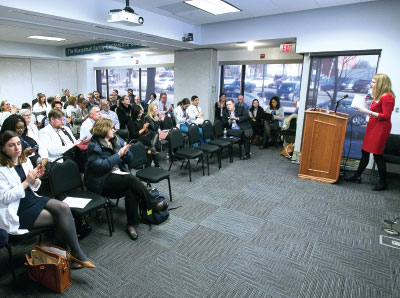Psychiatrists Lobby Lawmakers on MH Parity, Workforce Development
Abstract
As part of APA’s Federal Advocacy Conference, psychiatrists spent a day with lawmakers to encourage passage of a new mental health parity compliance bill as well as increased funding for residency positions and community mental health care.
More than 100 psychiatrists descended on Capitol Hill last month to press lawmakers and their staffs on a range of issues important to psychiatrists and their patients during APA’s Federal Advocacy Conference.

More than 100 APA members gathered in Washington, D.C., last month to participate in APA’s Federal Advocacy Conference. Participants learned the fine points of advocating on Capitol Hill and then put that new knowledge to work during visits with members of Congress and their staffs. The members wore white coats to emphasize they are physicians.
Psychiatrists primarily focused on garnering support for new federal mental health parity transparency legislation that APA is working to have introduced in Congress by Sen. Chris Murphy (D-Conn.). The bill would require health care plans to conduct and make available analyses to demonstrate compliance with the parity law and authorize more oversight by federal regulators. It is designed to boost compliance with parity law requirements by ensuring plans are providing adequate networks and that patient access to behavioral health care is not being thwarted by managed care practices, such as prior authorization requirements and lower reimbursement rates.
“I was thrilled to be a part of the conference. It’s the start of a new Congress, and with more than 100 freshman members in the House and Senate, now is the perfect time for us to get in there and develop new relationships,” said Patrick Runnels, M.D., M.B.A., chair of APA’s Council on Advocacy and Government Relations and associate chief medical officer of population health–behavioral health at University Hospitals in Northeast Ohio.
“It’s an opportunity for us to get our message out to new folks,” Runnels added. “And with everything going on at the federal level, it is a critical time for us to be highly invested in advocating for members of APA and their patients.”
Other top issues psychiatrists lobbied on included the integration of medical records for patients with substance use disorders (known as 42 CFR Part 2 reform), boosting funding for residency programs for the treatment of underserved patients, investing in public mental health programs, and improving behavioral health coverage under Medicare.
Involvement Makes a Difference
Megan Pruette, M.D., a PGY-4 resident at Duke University, lobbied on Capitol Hill for the first time as part of the conference, after spending a year working with state lawmakers while serving on the Executive Board of the North Carolina Psychiatric Association (NCPA). A particularly vexing problem for Pruette and her patients is the lack of available psychiatrists in health plan networks.

During APA’s 2019 Federal Advocacy Conference, psychiatrists from Michigan met with Sen. Gary Peters (D-Mich.). From left: Gregory Dalack, M.D., Mary Vance, M.D., Vasilis Pozios, M.D., Peters, Angela Pinheiro, M.D., Jennifer Severe, M.D., and Amy Humrichouser, M.D.
“There are literally none available. I go through a huge list of psychiatrists and find that they are all not taking patients for weeks, they’ve moved or died, or they don’t exist,” she said. “Ten years ago, the Mental Health Parity and Addiction Equity Act was passed, which was supposed to require health insurers to cover mental health and substance use care on a par with that for other medical disorders. But the enforcement of that law has been really poor.”
In fact, the NCPA found that only 12 percent of calls to psychiatrists on plan networks in North Carolina resulted in a mental health appointment, according to an NCPA survey. “People overuse the emergency room for mental health problems, but for many people there are not many other options,” Pruette said.
With the help of APA’s model legislation and its district branches, at least five states have already passed some version of a mental health parity compliance law, including Colorado, Delaware, Illinois, New York, and Tennessee. Wyoming passed a mental health parity bill this session, and its governor signed it last month. At least 11 other states are also advancing mental health parity compliance measures.
Psychiatrists’ Voices Needed to Bring About Change
Craig Obey, APA’s chief of government relations, said APA’s recent experience advocating for reforms of 42 CFR Part 2 underscores the importance of psychiatry’s input in the legislative process. In the last Congress, reform efforts hit a snag, as members of Congress struggled to balance patient protection and confidentiality concerns.
“It’s essential that psychiatrists lend their voices and tell stories from their experience about how the current system gets in the way of protecting their patients. That’s the currency that will help us effect real change,” Obey said.
Prior to the psychiatrists’ visits on Capitol Hill, APA staffers thoroughly prepped psychiatrists on the issues, coaching them on how to steer past controversial topics and find common ground with lawmakers, such as patient safety and patient care, Pruette said. “Still, I was quite nervous to meet with the senator from North Carolina because he’s quite conservative. But all my meetings went better than I had anticipated. I think as psychiatrists and physicians, we have a lot of clout when we speak to lawmakers. You carry a lot of clout when you wear a white coat.”

Erin Berry Philp, J.D., M.A., APA’s director of state government relations, provided APA’s 2019 Federal Advocacy Conference attendees with an overview of state legislative issues. She reminded participants that their advocacy skills are also needed at the state level.
Saeed Ahmed, M.D., a psychiatrist with Nassau University Medical Center, was awarded a scholarship as a first-time attendee at the conference. “The Federal Advocacy Conference gave me a powerful platform to advocate for mental health care,” Ahmed said. “We were heard, and we are hoping to see changes in the near future. I would love to follow up on these issues with legislators at both the state and federal levels.”
Runnels encourages all psychiatrists to get involved in the legislative process. He said the increased public attention on suicide and the opioid epidemic has resulted in unprecedented interest in the mental health system. “Members now have a real opportunity to help in shaping the future of health care delivery, building our workforce, and improving access for the treatment of mental health and substance use disorders.”
Ahmed expressed similar sentiments. “I believe it is the responsibility of all of us to raise awareness of the mental health concerns of our unheard patients who are suffering the ravages of psychiatric illnesses.” ■
Keep up with APA’s advocacy activity and get involved with its political action committee (APAPAC) at https://www.psychiatry.org/psychiatrists/advocacy.



